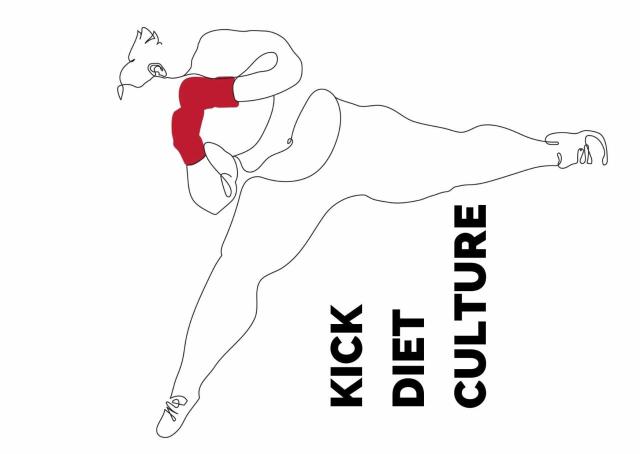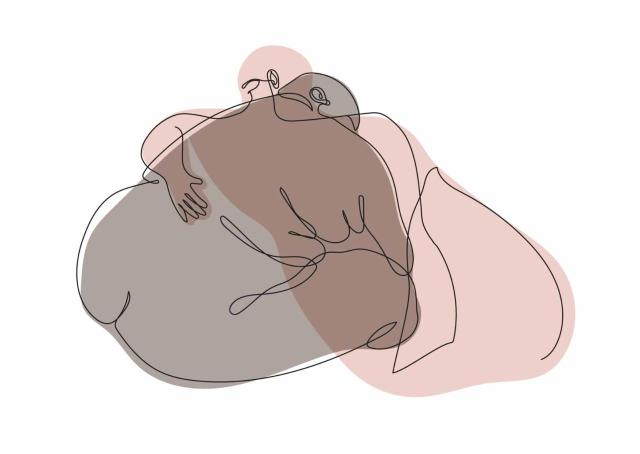Body Image, Touch and Intimacy
Body Shaming in Times of Covid-19
A few weeks into the first lockdown of 2020, the first fatphobic and ableist articles about “Corona diets” appeared and the panic of the post-pandemic “Corona body” started. In a time of crisis and uncertainty, besides the great unknown about the development of the virus, strategies and possible aftermath scenarios, homeschooling and care-work overloads, people started to panic about their optics.
Hello Patriarchal Neoliberali Bullshit!
What do you think happens in a crisis? Survival modes go off. Even if you believe that diets work (which, 95% of the time, they do not in the long run) and that you have to self-improve for a better life, doing this in a time of crisis is doubly stressful and anything but a “healthier lifestyle” or even “healing.” Putting more stress onto your body is not only not helpful, it is also dangerous for your mental health. Additionally it also doesn't help with weight either, because studies have shown that stress is a major factor in gaining weight.
Hello Vicious Circle of Diet Culture!
A helpful strategy in a time of crisis is to do things that actually support you in coping with the stress and regulating the nervous system: like moving, resting, and drinking and eating well.
The spike of Covid-related fatphobia endangered fat people and their health more than systemic fatphobia already does. Fat people are considered to be weak-willed, lazy, uninhibited, over-eating, unhealthily eaters, unathletic, sick, unhygienic, undesirable, incapable of sex, traumatized.
Fatphobia in day-to-day life means facing negligent treatment to even non-treatment in the health care sector, endangered mental health, discrimination on the job market and so forth. Fatphobia and body shaming in times of Covid meant not only a confirmation of all those things, but also put pressure on bodies that already had a lot of stress, as a pandemic was happening and a lot less movement options were available. The extent of fatphobia, ableism, and body shaming is so complex that I suggest you read a book about it (e.g. “Riot don't diet” by Elisabeth Lechner), since I cannot go into more detail here..
On the other side of social media, there were posts from compulsive bakers, cooks, and homecrafters, showing off their patisserie skills while others were supposed to go paleo vegan and work out 2 times a day. It was a battle—no, not against Covid—but for self-improvement.
Crisis as self-improvement. And at my core I think every crisis has wisdom, learnings, and ways to connect to our individual resilience. But as I mentioned above, in my opinion it's not a time to “improve,” it's a time to connect to oneself, to your inner truth, to others, to nature, to a bigger picture.
So, where do I want to go with this? Some might have used the pandemic as an opportunity to connect to themselves, to slow down, to prioritize—but many of us haven't had the chance to. Isolation and lack of touch combined with the intensified body shaming of the past two years are not helping us to feel and stay connected with one another.
This is a moment to press pause on that body shaming merry-go-round (not so merry, is it?) that is not only coming at us from all around, but that we have internalized as well.
This is a moment to refuse the additional stress on your body and psyche. This is a moment to reconnect with your body.
Body Neutrality and Body Positivity as a Way Out
This reconnection and ceasefire with your body may come either in the form of Body Neutrality or Body Positivity for you, whatever feels doable and right to you.
Body Neutrality is a state of looking at your body without a derogatory mindset —it is neither good nor bad. Its basis is understanding the body as a tool to live this life. It takes the focus off the body and the concepts of beauty.
Body Positivity has its roots in the BIPoC fat acceptance movement of the 60s and suffered a severe commercialization by mainstream media and product sectors over the last years. BoPo's goals were and are deeply political and radical, they are about structural discrimination, fatphobia, and ableism. It has nothing to do with buying yourself a new product to improve your self-love routine. It is neither shallow nor superficial. In my opinion, Body Positivity is a general positive approach to the body and a desire to feel good in it.
As a queer, fat woman, who took also a while to cope with her/their internalized homophobia, I can totally relate to the difficulty of relating to one's own body in a positive way. However, it is my goal to not let this patriarchal, capitalist system dictate how I see my body, how I interact with my body, what I can or cannot do with this body.
This is a good body.
It is good, because it is here on this earth and deserves a good life, like all of us.
I deserve respect like everybody else.
It is my birthright to live a life with joy and pleasure.
This is why I am Body Positive.
This is my resistance.
PRO TIP TO END THE WAR ON YOUR BODY: Feeling Yourself
Step 1: I suggest you unfollow all people (“friends” included) that share fatphobic or body shaming bullshit.
Step 2: Take down all your mirrors for a few weeks. Let your self-awareness and embodiment lead the way when you get dressed.
Step 3: Feel into yourself: How do I feel most comfortable in my clothes? How do I feel alive in my body? Which movement feels nice in my body?
The purpose of this exercise is to exchange an external perception onto your body for an internal embodied self-perception. Exchanging “How do I look?” for “What am I feeling in the body?”.
PRO TIP : Self touch
Yes, I hear you. You are probably tired of doing one more thing by yourself, it might seem like another project to self-improve. This is not about self-improvement, it's basically about you giving yourself the possibility to cope with all of the hardships in these times. Massage yourself, do some tapping (check EFT), stimulate the vagus nerve, masturbate on a regular basis, touch a tree if you like.
Self-touch like masturbation creates the happiness-hormone-cocktail oxytocin and dopamine. Oxytocin helps you connect and bond, feel love. Dopamine is a pleasure hormone that we need to do anything in life and there are many ways to activate it, sex is one of them.
People who suffer from depression have low dopamine levels. Self-touch and masturbation can be helpful for dealing with depression.
Secondly you also strengthen your body when you have orgasms: you are strengthening your pelvic floor and muscles, your bladder, your pain tolerance rises, it helps with cramps (but might make the bleeding heavier due to contractions during orgasm though), boosts the immune system, and releases physical tension.
Body Positivity and Intimacy
If you are having body image issues how can you connect and be intimate with another person? Intimacy is not just about sexuality, intimacy can even be totally non-sexual or even non-physical. Intimacy is a way to fully, authentically relate to another person, letting yourself be seen in various aspects of yourself and seeing another person as well.
In my case as a queer, fat woman that means, I let myself be seen (and maybe even touched) in my queerness and fatness. I am not hiding my body anymore, I am talking about what's on my heart and mind, I communicate my desires and boundaries. I first try to learn to be as honest with myself as I possibly can, and after that I share my truth and intimacy with people I trust.
For many years, sitting on someone’s lap was my absolute internalized fatphobic horror scenario, even during sex it was complicated. Two years ago, in a Wheel of Consent training for professionals, a colleague asked me whether I would lie on their body with my full body weight —like a sandwich. Panic came up. I took a breath. I did it. It was scary and healing and confusing all at once. But I finally understood that my heavy body was used as a barrier too often in my life. People see me anyway. I don't have to turn off the lights, wear shapewear or suck in my (since Covid even bigger) belly. People see that I am fat. People see where I am fat. People who kiss me and hug me and fuck me feel that I am fat.
If I want true connection, true intimacy, there's no need to separate my heart and soul and desire from my body—they are all one. Intimacy requires you to go all in.
PRO TIP TO GET INTIMATE WITH A BIG BODY: Let Yourself be Seen
Take up all the space you take up with your body. You have a right to be here.
Don't suck in your belly when you hug.
Turn on the lights when you make out.
Don't hide yourself under blankets.
Show yourself.
Let yourself be seen.





